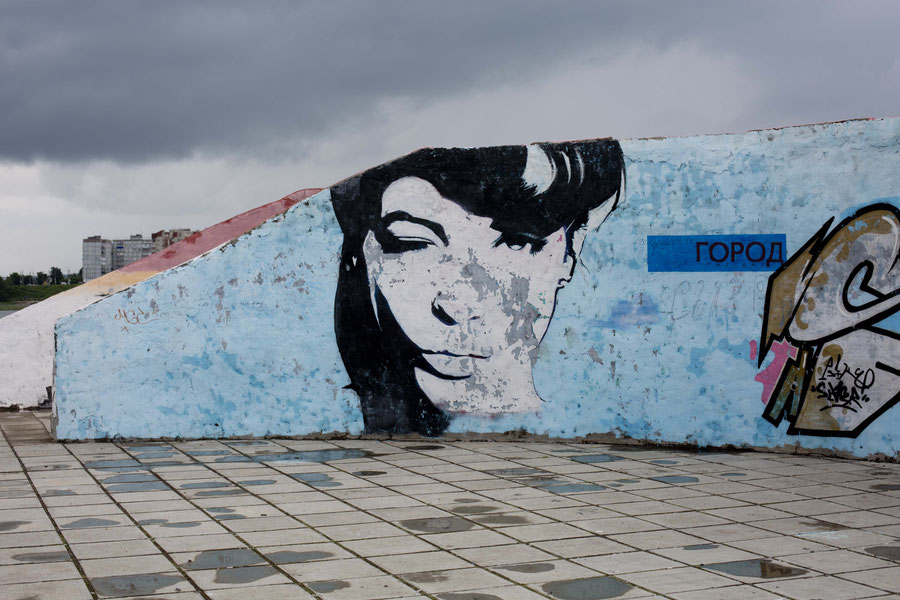I've lost the overview of what I've already written about and what I haven't. One thing is clear to me; I can't write about Russian traditions. My experience of the culture is entirely different from that in other (European) countries. All of my previous knowledge is tainted with prejudice. The cultural differences go so much deeper than I ever thought possible. I have spent the last three months getting rid of them. I have no expertise that would give me an inner compass. It makes writing about Russian traditions very hard and potentially a painful read for anyone who knows just a little bit about this country. I can't get beyond my own experience of this culture, and that fascinates me. So, I will write about the moments that have made me understand or experiences this culture with new eyes. And because it's easier to start where memory is fresh, that's what I'll do.
Recently, my hosts took me to a Russian theatre performance by a German company. A theatre group from Stuttgart (Russian director and three German actors) played "The Dead Souls" by Gogol, a text that is as familiar to the Russians here, as nothing in German literature to the Germans. Everyone in Russia has had to read it in 10th grade. Most people know the content, and everybody in attendances (with two exceptions) spoke or studied German.
In Germany, I can't imagine bringing together a group of eighty people to watch a foreign language show that is a translation from a German original. If you want to see a foreign-language play, there are theatres like "The English Theater" in Frankfurt, where actors from England and America perform their excellent shows. Germany is so small that it's comparatively easy to travel to one of the big cities where foreign shows are put on. Would we watch a British theatre company adapt our Faust? I doubt it. Also, I most likely wouldn't be interested. (Unless it's a unique thing that has won awards, or such. But maybe I'm especially snobbish in that regard?)
Only one thing irritated me to a point I couldn't ignore: The way the actors did the cross sign over their chests, for they crossed like Catholics, with their thumbs. Forehead, heart, left, right. A gesture of piety, familiar to me. In Russia, however, Orthodoxy prevails, they do the cross sign with their thumb, index and middle finger, pressed against each other. It's a little thing but it brakes my illusion every time because in this small gesture lies so much cultural meaning, that I have just been able to get through my brain. This little irritation feels like a victory to me.
I'm spoiled by the tangibility of our neighbours and the well-developed infrastructure of my small country. Here in Russia, people are genuinely happy that their literature is read at all. People ask questions that show how intrigued they are that in a country like Germany, a text that is mainly concerned with trickery and corruption, finds an audience. After all, the one thing that everybody seems to know about Germany is that there is virtually no corruption, that everybody follows the rules. (Ha! Ha!) Although I know a different Germany, I get how it would look that way for someone coming from Russia. Apart from that, people applaud the decision to give the role of Plushkin, the richest and stingiest countryman in the play, to a woman. They debate the representation of women in this particular play. Here, in the province of Russia, I can feel the waves of the newly awakened (mostly American) feminism of my generation. (Even if others firmly assert, it doesn't exist here.)
For me, finally, a dime dropped. The great Russian authors described above all their country and the characters it provided. They did what I am doing now (basically). Everything that seemed so extraordinarily strange, fantastic, cumbersome and far-fetched, is, in fact, not. It all fits this country. These extremely long novels are merely descriptions. Not that the reality described is still the same, it's more about the recognition of archetypes. I am fascinated by the material (which I cannot read in the original yet) that even the German translation entertains me. Does this make sense? Weirdly enough, it does to me.
* If you like what you read, consider supporting me on patreon!*



Write a comment
Janet Givens (Friday, 30 June 2017)
A lovely post, Isabelle. I hear your struggle to understand what seems strange to you. And that is what travel and growth and life are all about. I found a similar challenge when I lived in Kazakhstan. I so wanted to know which parts of the culture were ancient Kazakh and which parts were Soviet. It was only in my second year that I gave that distinction up. What I had to focus on was how that culture was different from what I knew, what I expected. And in the end, learn what all lucky travelers learn -- what my culture has taught me that I may (or may not) want to hang onto. I encourage you to keep on doing just what you are doing.
Isabelle (Tuesday, 04 July 2017 10:12)
Thank you, Janet! The distinction between Soviet and other underlying cultures is hard, but there is one. I realise that more and more, as I compare my home culture and Russia, but then also through the dialogue on your blog. The Eastern cultures are as varied as the Western ones. It should be a no-brainer but is still a realisation for me (in a sense, that now, I'm beginning to understand where those might be).
On that note: I am so sad that I won't visit Kazakhstan after all. I will have to come back to your memoir (which I was planning to read while travelling through Kazakstan) as a reference point in the future. Also, wouldn't that have been a unique reading? ;-)